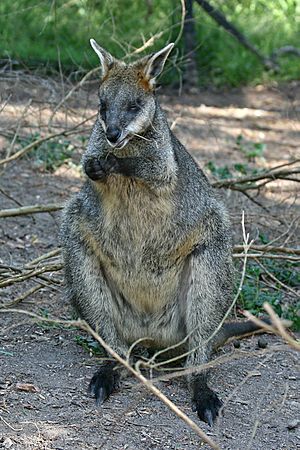Macropodinae facts for kids
Quick facts for kids Macropodinae |
|
|---|---|
 |
|
| Wallabia bicolor | |
| Scientific classification |
|
| Kingdom: | Animalia |
| Phylum: | Chordata |
| Class: | Mammalia |
| Infraclass: | Marsupialia |
| Order: | Diprotodontia |
| Family: | Macropodidae |
| Subfamily: | Macropodinae Gray, 1821 |
| Genera | |
|
|
|
Macropodinae is a group of amazing marsupials! These are animals like kangaroos, wallabies, and their close relatives. They belong to a larger family called Macropodidae. This group includes about 10 different types of animals, with at least 51 known species. Almost all living members of the Macropodidae family are part of the Macropodinae group. The only exception is the banded hare-wallaby.
Meet the Macropodinae Family
The Macropodinae group includes many interesting animals. They are all marsupials, which means their babies grow inside a pouch. You might know some of them as kangaroos or wallabies. Sometimes, the difference between a "kangaroo" and a "wallaby" is just about their size! Kangaroos are usually much larger than wallabies.
Different Types of Macropodinae
Here are some of the living groups (called genera) that belong to the Macropodinae family:
- Dendrolagus (tree-kangaroos – 14 species): These special kangaroos live in trees! They are great climbers and have long tails that help them balance. They weigh between 4 and 13 kilograms.
- Dorcopsis (greater dorcopsises – 4 species)
- Dorcopsulus (lesser dorcopsises – 2 species)
- Lagorchestes (hare-wallabies – 4 species): These wallabies are quick and small, like hares.
- Macropus (kangaroos, wallaroos, and wallabies – 16 species): This group includes the largest kangaroos you might think of.
- Onychogalea (nail-tail wallabies – 3 species): These wallabies have a unique spike at the end of their tail.
- Petrogale (rock-wallabies – 17 species): These are amazing climbers that live among rocks.
- Setonix (quokka): The quokka is a small, friendly wallaby known for its "smiling" face.
- Thylogale (pademelons – 7 species): Pademelons are small, shy wallabies that live in forests.
- Wallabia (swamp wallaby): This wallaby prefers wet, swampy areas.
See also
 In Spanish: Canguros para niños
In Spanish: Canguros para niños
 | May Edward Chinn |
 | Rebecca Cole |
 | Alexa Canady |
 | Dorothy Lavinia Brown |

